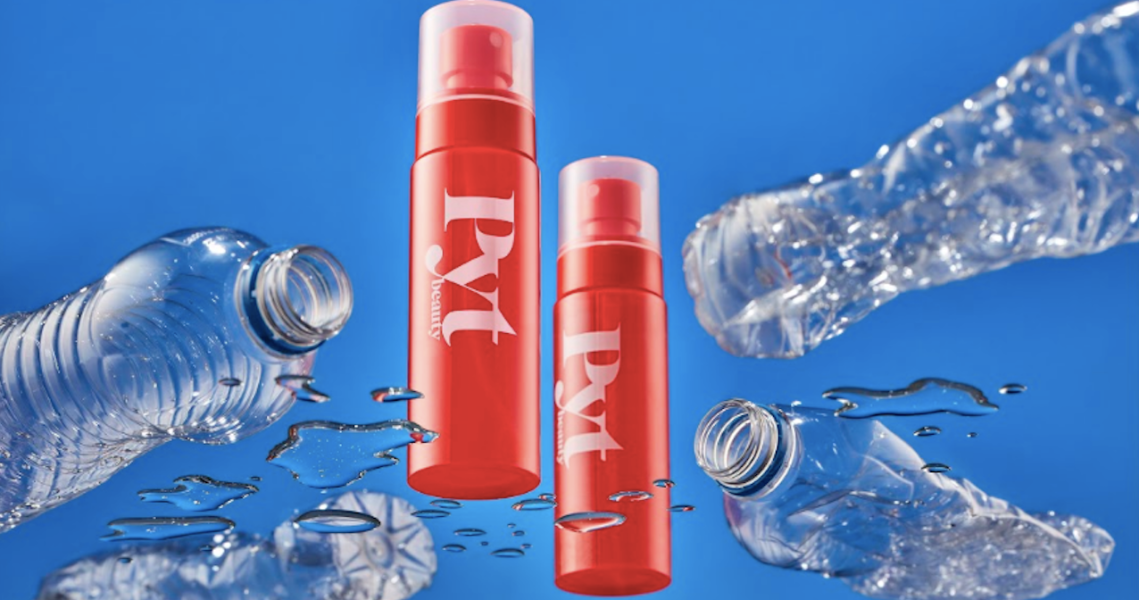PYT Beauty is refashioning itself in the name of sustainability.
On Friday, the 3-year-old clean beauty company announced it revisited its entire portfolio of nearly 20 products to eliminate certain products. At the same time, it introduced new products, reduced its plastic usage, improved its existing plastic options and ensured the recyclability of items. PYT Beauty is sold through Ulta, Credo Beauty and Macys and it will expand to 460 Target doors and the retailer’s e-commerce site by April 11. The company’s core customer demo is 18- to 34-years-old.
Many brands are relaunching and rebranding themselves in the name of sustainability, using their sustainability goals or achievements as a launchpad to talk about the brand in a fresher way. Most recently, OWA Haircare relaunched as Susteau in March, selling waterless products.
Mary Schulman, PYT Beauty CEO and co-founder, declined to share revenue figures, but said 2020 sales were down 15% compared to 2019 due to the brand’s heavy brick-and-mortar distribution. However, she expects 2021 to more than double 2020 sales. A sustainability focus among brands looking to attract or retain younger customers is starting to emerge as a more constant theme in the beauty industry, prompted by Gen Z’s concerns about the environment.
“Clean beauty itself has historically targeted an older demographic, and we felt there was an opportunity to breathe some life into the category and be a little bit more youthful and energetic,” said Achelle Richards, PYT Beauty partner and chief product and creative officer. “But the main driver was sustainability, which is a huge pillar to our business.”
The product portfolio changes include phasing out concealer to focus on eyes, lips, cheeks and other universal categories for the face. New products include eye and face primers, brow gel, liquid eyeliner, and a setting spray. The entire portfolio has been re-packaged to include post-consumer recycled plastic or sugarcane-based plastic. The brand also introduced pre-degraded plastic packaging, which is purported to speed up plastic waste degradation if it ends up in a landfill. Richards said these efforts reduce carbon emissions by approximately 77% when taking into account the new materials, the reduced packaging sizes and thickness, and the elimination of mirrors from palettes. She said PYT Beauty had to create its own product molds to facilitate the use of mono-materials products that are curbside recyclable; they’re void of metal hinges and springs that could interfere with recyclability. From conceptualization to execution, PYT Beauty’s updates took approximately a year to pull off.
Schulman said that PYT Beauty experienced increased packaging costs of 20-50% when transitioning to post-consumer materials from virgin materials. However, PYT Beauty has opted not to increased its prices, which are all under $28.
To inform customers of the relaunch, PYT Beauty is planning a large push with Target on Earth Day, April 22. PYT Beauty will be featured in the retailer’s website section dedicated to sustainability and the retailer’s Earth Day communications.
On its own DTC e-commerce, a pop-up window informs customers about the new recycled plastic packaging, as does a banner photo on the homepage. A special pull-down menu displays sustainability information on individual product pages. Packages themselves include recycling symbols on the front, alongside copy relaying material composition. On the back are further recycling information and instructions.
“We have all been inundated with the problems and challenges [of climate change], but the younger generations are worried about their future and their children’s future,” said Schulman. “They [believe they] can help make an impact by supporting sustainable brands. They want to feel good about the purchase they’re making and know that they’re investing in the future of the Earth.”




